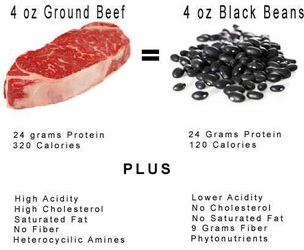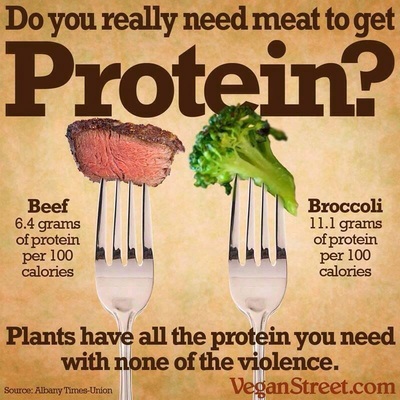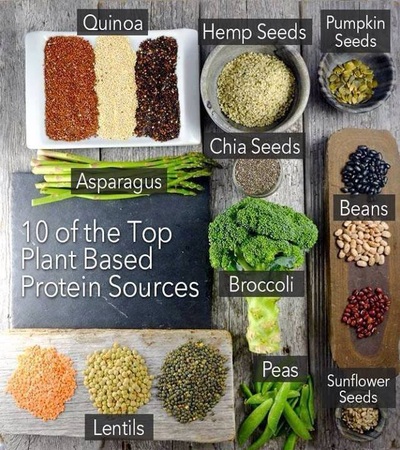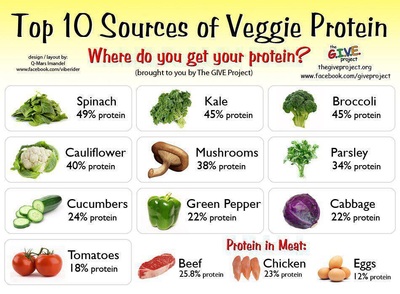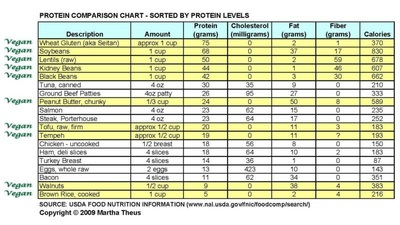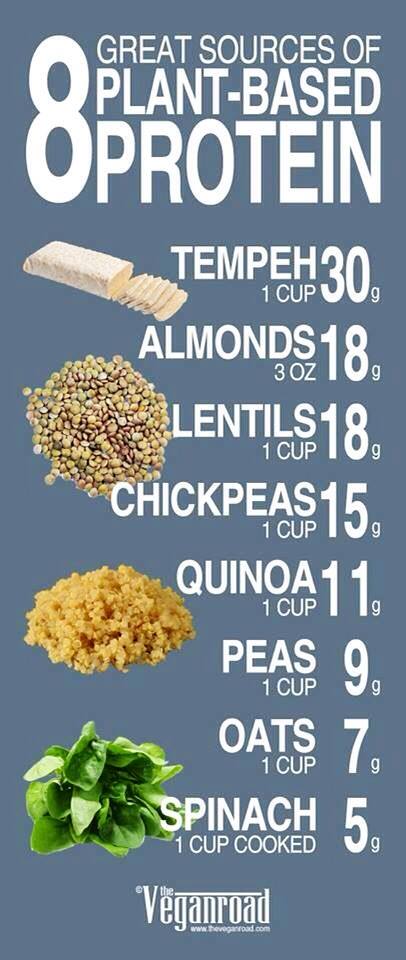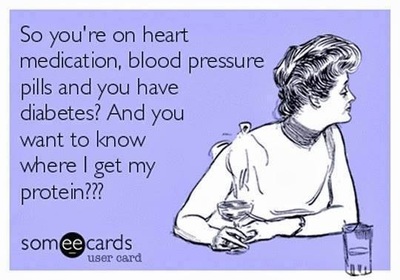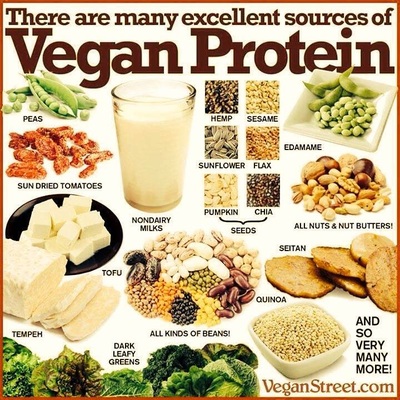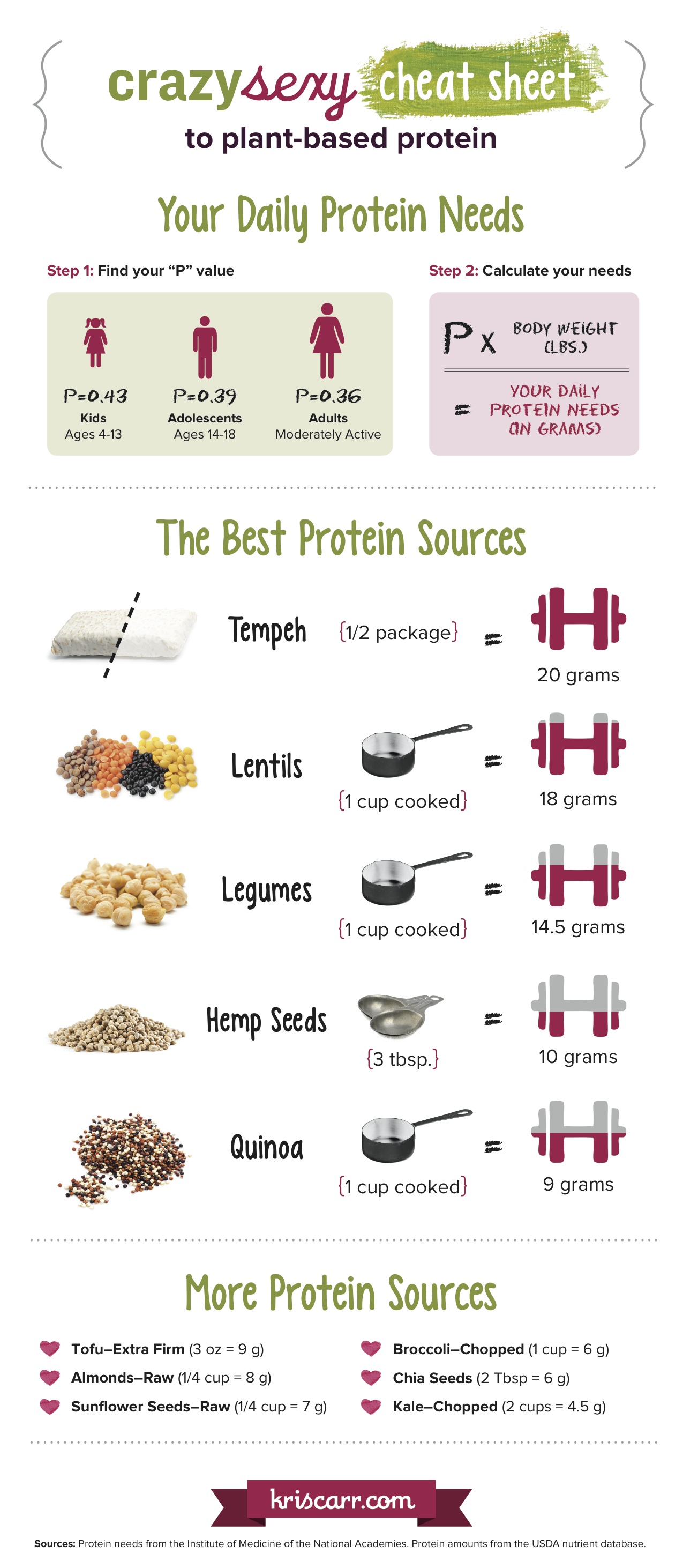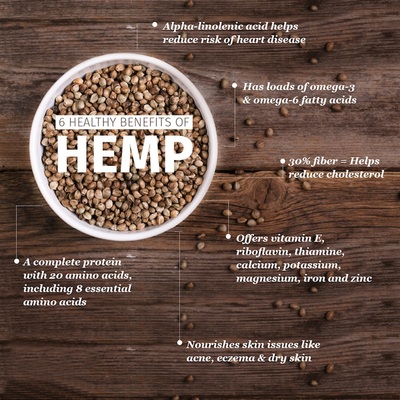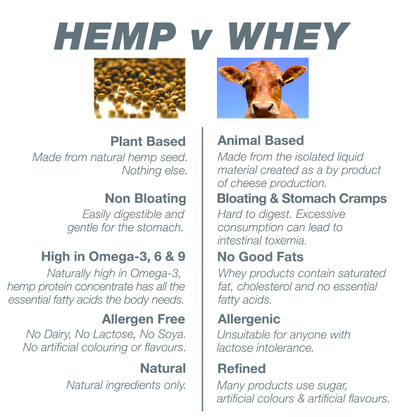The Surprising Truth About Protein - Why Some Proteins Are Better Than Others
"What comes to mind when you hear the word “protein?” If you were to say meat, you’re not alone. Most of us have been conditioned to equate protein with animal-based food... Vegetables are just as veritable a source of protein as animals, but there seems to be a lingering concern about the perceived quality of plant-based proteins. And this has led many to believe that plant proteins rank much lower on the nutritional ladder than proteins derived from foods like poultry, eggs and steak. But this is hardly the case."
Click Here for the article.
"What comes to mind when you hear the word “protein?” If you were to say meat, you’re not alone. Most of us have been conditioned to equate protein with animal-based food... Vegetables are just as veritable a source of protein as animals, but there seems to be a lingering concern about the perceived quality of plant-based proteins. And this has led many to believe that plant proteins rank much lower on the nutritional ladder than proteins derived from foods like poultry, eggs and steak. But this is hardly the case."
Click Here for the article.
The Protein Juggernaut Has Deep Roots
Interesting article on the distorted history of protein.
"It is through our ignorance of history, especially that concerning protein, that we continue to repeat it. This history shows how we came to revere increasing consumption of so-called high quality protein and, as a result, we have substantially skewed our dietary practices in favor of the consumption of animal-based foods at the expense of plant-based foods. As a result, too many people (professionals included) justify this practice in the name of good science but they do so without knowing the historical basis for their views. We all pay the price."
Click Here for the article.
Interesting article on the distorted history of protein.
"It is through our ignorance of history, especially that concerning protein, that we continue to repeat it. This history shows how we came to revere increasing consumption of so-called high quality protein and, as a result, we have substantially skewed our dietary practices in favor of the consumption of animal-based foods at the expense of plant-based foods. As a result, too many people (professionals included) justify this practice in the name of good science but they do so without knowing the historical basis for their views. We all pay the price."
Click Here for the article.
The Protein Myth
"In the past, some people believed one could never get too much protein. Health-conscious people were encouraged to boost their protein intake. Today, some diet books encourage high-protein intake for weight loss... And while individuals following such a diet have sometimes had short-term success in losing weight, they are often unaware of the health risks associated with a high-protein diet. Excess protein has been linked with osteoporosis, kidney disease, calcium stones in the urinary tract, and some cancers."
Click Here for the article.
"In the past, some people believed one could never get too much protein. Health-conscious people were encouraged to boost their protein intake. Today, some diet books encourage high-protein intake for weight loss... And while individuals following such a diet have sometimes had short-term success in losing weight, they are often unaware of the health risks associated with a high-protein diet. Excess protein has been linked with osteoporosis, kidney disease, calcium stones in the urinary tract, and some cancers."
Click Here for the article.
The Myth of Complementary Protein
“I’ve read that because plant foods don’t contain all the essential amino acids that humans need, to be healthy we must either eat animal protein or combine certain plant foods with others in order to ensure that we get complete proteins.” The woman who said this identified herself as a medical resident and stated that her current textbook in human physiology states this and that in her classes, her professors have emphasized this point. This is one of the oldest myths related to vegetarianism and was disproved long ago. It is important to correct this misinformation, because many people are afraid to follow healthful, plant-based, and/or total vegetarian (vegan) diets because they worry about “incomplete proteins” from plant sources.
Click Here for the article.
“I’ve read that because plant foods don’t contain all the essential amino acids that humans need, to be healthy we must either eat animal protein or combine certain plant foods with others in order to ensure that we get complete proteins.” The woman who said this identified herself as a medical resident and stated that her current textbook in human physiology states this and that in her classes, her professors have emphasized this point. This is one of the oldest myths related to vegetarianism and was disproved long ago. It is important to correct this misinformation, because many people are afraid to follow healthful, plant-based, and/or total vegetarian (vegan) diets because they worry about “incomplete proteins” from plant sources.
Click Here for the article.
The Mystique of Protein and Its Implications
"Protein, ever since its discovery in 1839, has been considered by many people to be an exceptionally important nutrient, often assuming that the more we consume the better. Its name comes from the Greek word, proteios, meaning ‘of prime importance’—an auspicious and almost mystical beginning for the future of this nutrient! Add to this importance the long standing impression by most people that protein is exclusive to animal source foods.
We now know, however, that this importance is exaggerated, to mythical proportions."
Click Here for the article.
"Protein, ever since its discovery in 1839, has been considered by many people to be an exceptionally important nutrient, often assuming that the more we consume the better. Its name comes from the Greek word, proteios, meaning ‘of prime importance’—an auspicious and almost mystical beginning for the future of this nutrient! Add to this importance the long standing impression by most people that protein is exclusive to animal source foods.
We now know, however, that this importance is exaggerated, to mythical proportions."
Click Here for the article.
A Vegan Doctor Addresses The Protein Question
"Nearly all of what I treat in the Emergency Department is diet related. We have eaten ourselves into a state of sickness, and it is fueled by misinformation."
Click Here for the article.
"Nearly all of what I treat in the Emergency Department is diet related. We have eaten ourselves into a state of sickness, and it is fueled by misinformation."
Click Here for the article.
Where Do You Get Your Protein?
The role and need for protein is a much misunderstood topic in our society. In this article you will learn how to better understand the role of protein in your diet.
Click Here for the article.
The role and need for protein is a much misunderstood topic in our society. In this article you will learn how to better understand the role of protein in your diet.
Click Here for the article.
BUSTED: Top Vegan Nutrition Myths
"Gloria Steinem summed up one of the challenges of life very well when she said, "The first problem for all of us, men and women, is not to learn, but to unlearn." This is particularly true of our knowledge of food and diet.
Click Here for the article.
"Gloria Steinem summed up one of the challenges of life very well when she said, "The first problem for all of us, men and women, is not to learn, but to unlearn." This is particularly true of our knowledge of food and diet.
Click Here for the article.
Protein in the Vegan Diet
"Some Americans are obsessed with protein. Vegans are bombarded with questions about where they get their protein. Athletes used to eat thick steaks before competition because they thought it would improve their performance. Protein supplements are sold at health food stores. This concern about protein is misplaced.
Although protein is certainly an essential nutrient which plays many key roles in the way our bodies function, we do not need huge quantities of it. It is easy for a vegan diet to meet recommendations for protein, as long as calorie intake is adequate. Strict protein combining is not necessary; it is more important to eat a varied diet throughout the day."
Click Here for the article.
"Some Americans are obsessed with protein. Vegans are bombarded with questions about where they get their protein. Athletes used to eat thick steaks before competition because they thought it would improve their performance. Protein supplements are sold at health food stores. This concern about protein is misplaced.
Although protein is certainly an essential nutrient which plays many key roles in the way our bodies function, we do not need huge quantities of it. It is easy for a vegan diet to meet recommendations for protein, as long as calorie intake is adequate. Strict protein combining is not necessary; it is more important to eat a varied diet throughout the day."
Click Here for the article.
Slaying The Protein Dragon
“But where do you get your protein?... As a plant-based ultra-endurance athlete, if I had a dollar for every time I fielded this inquiry, I could put my four kids through college. So let’s address the elephant in the room, once and for all."
Click Here for the article by Rich Roll, Vegan Ultra Athlete .
“But where do you get your protein?... As a plant-based ultra-endurance athlete, if I had a dollar for every time I fielded this inquiry, I could put my four kids through college. So let’s address the elephant in the room, once and for all."
Click Here for the article by Rich Roll, Vegan Ultra Athlete .
Protein in Plant-based Diet: A Vegan Bodybuilder's Perspective
"The most common questions a vegan gets, upon sharing that he or she follows a plant-based diet, are: Where do you get your protein? How do you get enough? Do you have to combine plant proteins? These questions will often come from individuals who, prior to their concern that your plant-based diet will lead you to die of protein deficiency, never gave a thought to nutrition in their life. This can frustrate the most docile vegan into belligerence, but it is an important question to a lot of people, so it deserves a thoughtful answer. Where does our protein come from?"
Click Here to read the article by Derek Tresize: Vegan Bodybuilder.
"The most common questions a vegan gets, upon sharing that he or she follows a plant-based diet, are: Where do you get your protein? How do you get enough? Do you have to combine plant proteins? These questions will often come from individuals who, prior to their concern that your plant-based diet will lead you to die of protein deficiency, never gave a thought to nutrition in their life. This can frustrate the most docile vegan into belligerence, but it is an important question to a lot of people, so it deserves a thoughtful answer. Where does our protein come from?"
Click Here to read the article by Derek Tresize: Vegan Bodybuilder.
Animal vs. Plant Protein
"We have information that the primary difference between animal and plant proteins is their amino acid profiles and it is those profiles that direct the rates at which the absorbed amino acids are put to use within the body. Animal based proteins, of course, are much more similar to our proteins, thus are used more readily and rapidly than plant proteins... Plant proteins are somewhat compromised by their limitation of one or more amino acids. When we restore the relatively deficient amino acid in a plant protein, we get a response rate equivalent to animal proteins."
Click Here for the interview with T. Colin Campbell, PhD
"We have information that the primary difference between animal and plant proteins is their amino acid profiles and it is those profiles that direct the rates at which the absorbed amino acids are put to use within the body. Animal based proteins, of course, are much more similar to our proteins, thus are used more readily and rapidly than plant proteins... Plant proteins are somewhat compromised by their limitation of one or more amino acids. When we restore the relatively deficient amino acid in a plant protein, we get a response rate equivalent to animal proteins."
Click Here for the interview with T. Colin Campbell, PhD
Plant Protein Preferable
Dr. Walter Willet, the Chair of Harvard's nutrition department, recommends we emphasize plant sources of protein rather than animal sources.
Dr. Walter Willet, the Chair of Harvard's nutrition department, recommends we emphasize plant sources of protein rather than animal sources.
Never Mind the Meat - Worry About Eating Enough Plants
"For many, the notion of eschewing — or significantly cutting back on — meat, eggs, and dairy brings up nutritional concerns... not only are those concerns usually unfounded, they should pale in comparison to the question of getting enough plant-based foods."
Read the article by Clicking Here.
"For many, the notion of eschewing — or significantly cutting back on — meat, eggs, and dairy brings up nutritional concerns... not only are those concerns usually unfounded, they should pale in comparison to the question of getting enough plant-based foods."
Read the article by Clicking Here.
How Plant Protein Gives You Strength (Without Aging You)
"There is a misconception that only meat can give you strength. But plant protein can actually give you strength (a.k.a. protein) with the added phytonutrients, fiber, vitamins, and minerals that meat does NOT offer. This is particularly important because plants’ phytonutrients have numerous benefits such as fighting inflammation and cancer, reversing aging, and healing our bodies from diseases. This is why plants can give you protein and strength, without aging you."
Click Here for the article.
"There is a misconception that only meat can give you strength. But plant protein can actually give you strength (a.k.a. protein) with the added phytonutrients, fiber, vitamins, and minerals that meat does NOT offer. This is particularly important because plants’ phytonutrients have numerous benefits such as fighting inflammation and cancer, reversing aging, and healing our bodies from diseases. This is why plants can give you protein and strength, without aging you."
Click Here for the article.
Why High Animal Protein Diets Age You Faster
"Diets high in animal products can cause a host of health problems ranging from increased risk of heart disease and certain cancers to weight gain and autoimmune disorders, deteriorating digestive probiotics within. What many people don’t realize, however, is just how aging consumption of animal protein can be. While many people think that animal protein is healthy as long as its lean, the truth is that all types of animal proteins are unhealthy and can lead to critical imbalances in your body that sap you of your energy, drain minerals from your bones and cells, and actually speed up the aging process."
Click Here for the article.
"Diets high in animal products can cause a host of health problems ranging from increased risk of heart disease and certain cancers to weight gain and autoimmune disorders, deteriorating digestive probiotics within. What many people don’t realize, however, is just how aging consumption of animal protein can be. While many people think that animal protein is healthy as long as its lean, the truth is that all types of animal proteins are unhealthy and can lead to critical imbalances in your body that sap you of your energy, drain minerals from your bones and cells, and actually speed up the aging process."
Click Here for the article.
Association Between Protein Intake and Blood Pressure
"Vegetable protein intake was inversely related to blood pressure. This finding is consistent with recommendations that a diet high in vegetable products be part of healthy lifestyle for prevention of high blood pressure and related diseases."
Click Here for the article.
"Vegetable protein intake was inversely related to blood pressure. This finding is consistent with recommendations that a diet high in vegetable products be part of healthy lifestyle for prevention of high blood pressure and related diseases."
Click Here for the article.
Get Pumped With Plant Protein, Naturally
"It is exercise — not food — that stimulates muscle growth. After a workout triggers muscle-building, dietary protein provides the raw materials that muscles need in order to grow. If you are following a Nutritarian diet, which includes many protein-rich whole plant foods, you can easily consume adequate protein..."
Click Here for the article.
"It is exercise — not food — that stimulates muscle growth. After a workout triggers muscle-building, dietary protein provides the raw materials that muscles need in order to grow. If you are following a Nutritarian diet, which includes many protein-rich whole plant foods, you can easily consume adequate protein..."
Click Here for the article.
The Cleanest Sources of Plant-Based Protein
"Choosing the right proteins for ingestion is paramount to maintaining a healthy diet, so from Green Monster to Green Monster, we give you a list of the top seven (the lucky number in Japan) cleanest sources of protein:"
Click Here for the article.
"Choosing the right proteins for ingestion is paramount to maintaining a healthy diet, so from Green Monster to Green Monster, we give you a list of the top seven (the lucky number in Japan) cleanest sources of protein:"
Click Here for the article.
My Crazy Sexy Guide to Plant-Based Protein
“The belief that we need enormous amounts of protein to be healthy and strong is one of the most pervasive myths... Studies show that as protein consumption goes up, so do the rates of chronic disease... The USDA’s recommended daily allowance is about 0.36 gram of protein for every pound of body weight (so, at 130 pounds, you’d need about 47 grams of protein daily)...The average American adult consumes between 100 and 120 grams of protein every day. Not only is that nearly two to three times what we need, it comes mostly from high-fat animal products.”
Click Here for the article.
“The belief that we need enormous amounts of protein to be healthy and strong is one of the most pervasive myths... Studies show that as protein consumption goes up, so do the rates of chronic disease... The USDA’s recommended daily allowance is about 0.36 gram of protein for every pound of body weight (so, at 130 pounds, you’d need about 47 grams of protein daily)...The average American adult consumes between 100 and 120 grams of protein every day. Not only is that nearly two to three times what we need, it comes mostly from high-fat animal products.”
Click Here for the article.
A Green Monster’s Guide to Plant-Based Nutrition: Plant-Based Protein
"Plant-based sources of protein are abundant in whole foods. These foods contain incredible amounts of nutrient-dense properties that your body and brain can use to help you feel your best. They also don’t lead to inflammation like animal sources and they’re much better for the entire planet."
Click Here for the article.
"Plant-based sources of protein are abundant in whole foods. These foods contain incredible amounts of nutrient-dense properties that your body and brain can use to help you feel your best. They also don’t lead to inflammation like animal sources and they’re much better for the entire planet."
Click Here for the article.
My Top 7 Sources Of Plant-Based Protein
“I say it all the time. Contrary to popular belief, it’s not only possible to optimize your health on a plant-based diet; when done right, I actually recommend it. “
By Rich Roll, Vegan Ultra Athlete
Read the article by Clicking Here.
“I say it all the time. Contrary to popular belief, it’s not only possible to optimize your health on a plant-based diet; when done right, I actually recommend it. “
By Rich Roll, Vegan Ultra Athlete
Read the article by Clicking Here.
5 Soy-Free Vegan Foods That Have More Protein Than Beef
Here are five foods with more protein per ounce than beef that also come with a higher percentage of protein per amount of calories:
Click Here for the article.
Here are five foods with more protein per ounce than beef that also come with a higher percentage of protein per amount of calories:
Click Here for the article.
Plant Based Power
Can a vegan diet nourish a serious training regimen? Endurance athlete Brendan Brazier considers himself proof.
"When Brendan Brazier was 15, a coach told him he could either be an athlete or a vegan — not both. Twenty-two years, two Ultramarathon championships and a career as a professional Ironman later, it's safe to say he's proven his old mentor wrong."
Read the article by Clicking here.
Can a vegan diet nourish a serious training regimen? Endurance athlete Brendan Brazier considers himself proof.
"When Brendan Brazier was 15, a coach told him he could either be an athlete or a vegan — not both. Twenty-two years, two Ultramarathon championships and a career as a professional Ironman later, it's safe to say he's proven his old mentor wrong."
Read the article by Clicking here.
Plant Based Nutrition & Strength Athlete
"In the fitness industry today plant-based nutrition is seldom the first thing that comes to most people’s minds when they think of proper sports nutrition, despite the mounting evidence illustrating that a vegan diet fuels performance, enhances recovery, and prevents/reverses many chronic diseases."
Read the article by Clicking Here.
"In the fitness industry today plant-based nutrition is seldom the first thing that comes to most people’s minds when they think of proper sports nutrition, despite the mounting evidence illustrating that a vegan diet fuels performance, enhances recovery, and prevents/reverses many chronic diseases."
Read the article by Clicking Here.
Protein Is Necessary, But Don’t Forget About Carbs and Fiber!
"if you cut back too far on the carbs, you can put your body into real trouble in the short term by lowering the pH of the blood and going into uncontrolled ketosis called, ketoacidosis. This is a life threatening state and needs immediate medical attention. On the other hand, a less dramatic lack of glucose can cause issues in the body as well. For those on a high protein diet, there are a whole host of issues that can occur when this type of eating regime is done long term.
As so many things in life, some protein is great, but there is a limit that your body can handle."
Click Here for the article.
See also section on Carbohydrates.
"if you cut back too far on the carbs, you can put your body into real trouble in the short term by lowering the pH of the blood and going into uncontrolled ketosis called, ketoacidosis. This is a life threatening state and needs immediate medical attention. On the other hand, a less dramatic lack of glucose can cause issues in the body as well. For those on a high protein diet, there are a whole host of issues that can occur when this type of eating regime is done long term.
As so many things in life, some protein is great, but there is a limit that your body can handle."
Click Here for the article.
See also section on Carbohydrates.
Do We Get Enough Protein & Fiber?
High Protein Intake Linked to Increased Cancer, Diabetes, and Overall Mortality
Low Protein Intake Is Associated with a Major Reduction in IGF-1, Cancer, and Overall Mortality in the 65 and Younger population.
Click Here for the study.
Low Protein Intake Is Associated with a Major Reduction in IGF-1, Cancer, and Overall Mortality in the 65 and Younger population.
Click Here for the study.
High-Protein Diet May Be Dangerous for Those at Risk of Heart Disease
"A high-protein diet may backfire for people at risk for heart disease -- increasing the likelihood of weight gain and early death, a new study suggests."
Click Here for the article.
"A high-protein diet may backfire for people at risk for heart disease -- increasing the likelihood of weight gain and early death, a new study suggests."
Click Here for the article.
Dr. Dean Ornish Weighs In on Hazards of the High-Protein Trend
“Although people have been told for decades to eat less meat and fat, Americans actually consumed 67 percent more added fat, 39 percent more sugar, and 41 percent more meat in 2000 than they had in 1950 and 24.5 percent more calories than they had in 1970, according to the Agriculture Department. Not surprisingly, we are fatter and unhealthier.
The debate is not as simple as low-fat versus low-carb. Research shows that animal protein may significantly increase the risk of premature mortality from all causes, among them cardiovascular disease, cancer and Type 2 diabetes. Heavy consumption of saturated fat and trans fats may double the risk of developing Alzheimer’s disease.
A study published last March found a 75 percent increase in premature deaths from all causes, and a 400 percent increase in deaths from cancer and Type 2 diabetes, among heavy consumers of animal protein under the age of 65 — those who got 20 percent or more of their calories from animal protein."
Click Here for the article.
“Although people have been told for decades to eat less meat and fat, Americans actually consumed 67 percent more added fat, 39 percent more sugar, and 41 percent more meat in 2000 than they had in 1950 and 24.5 percent more calories than they had in 1970, according to the Agriculture Department. Not surprisingly, we are fatter and unhealthier.
The debate is not as simple as low-fat versus low-carb. Research shows that animal protein may significantly increase the risk of premature mortality from all causes, among them cardiovascular disease, cancer and Type 2 diabetes. Heavy consumption of saturated fat and trans fats may double the risk of developing Alzheimer’s disease.
A study published last March found a 75 percent increase in premature deaths from all causes, and a 400 percent increase in deaths from cancer and Type 2 diabetes, among heavy consumers of animal protein under the age of 65 — those who got 20 percent or more of their calories from animal protein."
Click Here for the article.
The Protein Problem: Why Eating Too Much Chicken Might Not Help Your Diet
"When it comes to diet, many health-conscious consumers have come to the conclusion that protein is king. Specifically: chicken. Diet trends have overstated the importance of eating a lot of meat. At the same time, consumers have been put off red meat by its associated health and environmental concerns. This has led to consumers increasingly eating more chicken instead... But at what cost?"
Click Here for the article.
"When it comes to diet, many health-conscious consumers have come to the conclusion that protein is king. Specifically: chicken. Diet trends have overstated the importance of eating a lot of meat. At the same time, consumers have been put off red meat by its associated health and environmental concerns. This has led to consumers increasingly eating more chicken instead... But at what cost?"
Click Here for the article.
Intestinal Microbial Metabolism of Phosphatidylcholine and Cardiovascular Risk
"Recent studies in animals have shown a mechanistic link between intestinal microbial metabolism of the choline moiety in dietary phosphatidylcholine (lecithin) and coronary artery disease through the production of a proatherosclerotic metabolite, trimethylamine-N-oxide (TMAO). We investigated the relationship among intestinal microbiota-dependent metabolism of dietary phosphatidylcholine, TMAO levels, and adverse cardiovascular events in humans... CONCLUSIONS: The production of TMAO from dietary phosphatidylcholine is dependent on metabolism by the intestinal microbiota. Increased TMAO levels are associated with an increased risk of incident major adverse cardiovascular events. (Funded by the National Institutes of Health and others.)."
Click Here for the study.
"Recent studies in animals have shown a mechanistic link between intestinal microbial metabolism of the choline moiety in dietary phosphatidylcholine (lecithin) and coronary artery disease through the production of a proatherosclerotic metabolite, trimethylamine-N-oxide (TMAO). We investigated the relationship among intestinal microbiota-dependent metabolism of dietary phosphatidylcholine, TMAO levels, and adverse cardiovascular events in humans... CONCLUSIONS: The production of TMAO from dietary phosphatidylcholine is dependent on metabolism by the intestinal microbiota. Increased TMAO levels are associated with an increased risk of incident major adverse cardiovascular events. (Funded by the National Institutes of Health and others.)."
Click Here for the study.
High-Protein, Reduced-Carbohydrate Weight-Loss Diets Promote Metabolite Profiles Likely To Be Detrimental To Colonic Health
"Weight-loss diets that were high in protein but reduced in total carbohydrates and fiber resulted in a significant decrease in fecal cancer-protective metabolites and increased concentrations of hazardous metabolites. Long-term adherence to such diets may increase risk of colonic disease."
Click Here for the study.
"Weight-loss diets that were high in protein but reduced in total carbohydrates and fiber resulted in a significant decrease in fecal cancer-protective metabolites and increased concentrations of hazardous metabolites. Long-term adherence to such diets may increase risk of colonic disease."
Click Here for the study.
